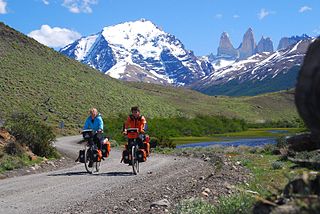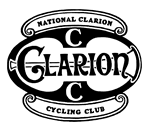
A bicycle, also called a pedal cycle, bike or cycle, is a human-powered or motor-powered assisted, pedal-driven, single-track vehicle, having two wheels attached to a frame, one behind the other. A bicycle rider is called a cyclist, or bicyclist.

Cycling, also called bicycling or biking, is the use of bicycles for transport, recreation, exercise or sport. People engaged in cycling are referred to as "cyclists", "bicyclists", or "bikers". Apart from two-wheeled bicycles, "cycling" also includes the riding of unicycles, tricycles, quadricycles, recumbent and similar human-powered vehicles (HPVs).

The term road bicycle is used to describe bicycles built for traveling at speed on paved roads. Some sources use the term to mean racing bicycle. Other sources specifically exclude racing bicycles from the definition, using the term to mean a bicycle of a similar style but built more for endurance and less the fast bursts of speed desired in a racing bicycle; as such, they usually have more gear combinations and fewer hi-tech racing features. Certain of these bicycles have been referred to as 'sportive' bicycles to distinguish them from racing bicycles.

Bicycle touring is the taking of self-contained cycling trips for pleasure, adventure or autonomy rather than sport, commuting or exercise. Touring can range from single-day trips, to multi-day trips, to years. Tours may be planned by the participant or organised by a holiday business, a club, or a charity as a fund-raising venture.

Cycle sport is competitive physical activity using bicycles. There are several categories of bicycle racing including road bicycle racing, cyclo-cross, mountain bike racing, track cycling, BMX, and cycle speedway. Non-racing cycling sports include artistic cycling, cycle polo, freestyle BMX and mountain bike trials. The Union Cycliste Internationale (UCI) is the world governing body for cycling and international competitive cycling events. The International Human Powered Vehicle Association is the governing body for human-powered vehicles that imposes far fewer restrictions on their design than does the UCI. The UltraMarathon Cycling Association is the governing body for many ultra-distance cycling races.

Cycling in Melbourne, the capital city of Victoria, Australia, is enhanced by the city's relatively flat topography and generally mild climate. The city has an active cycling culture for commuting, recreation, fitness and sport, and the metropolitan area has an extensive network of off-road bicycle paths, as well as designated bicycle lanes on many streets.

Road bicycle racing is the cycle sport discipline of road cycling, held on paved roads. Road racing is the most popular professional form of bicycle racing, in terms of numbers of competitors, events and spectators. The two most common competition formats are mass start events, where riders start simultaneously and race to a set finish point; and time trials, where individual riders or teams race a course alone against the clock. Stage races or "tours" take multiple days, and consist of several mass-start or time-trial stages ridden consecutively.

This is a glossary of terms and jargon used in cycling, mountain biking, and cycle sport.

European Cyclists' Federation (ECF) is an umbrella federation for national cycling organizations throughout Europe.

Scottish Cycling, legally the Scottish Cyclists' Union (SCU), is the governing body for cycle sport in Scotland and is part of British Cycling, the national governing body in Britain.

Cycling Weekly is a British cycling magazine. It is published by Future and is devoted to the sport and pastime of cycling. It used to be affectionately referred to by British club cyclists as "The Comic".
Charlotteville Cycling Club is a cycling club in Guildford, southern England. The club incorporated in 1903, saw a national record broken in 1934 by Harry Ferris and organises the Guildford Town Centre Races, which have taken place since 1984.
The Oregon Bicycle Racing Association is a bicycle racing organization based in the U.S. state of Oregon.

Robert ("Bob") Charles Mionske is a two-time U.S. Olympic racing cyclist and U.S. National Champion (1990). In the 1988 Summer Olympics, held in Seoul, South Korea, he placed fourth in the Individual Road Race. He retired from professional cycling in 1993 and is now an attorney based in Portland, Oregon, with a practice in bicycle law. He wrote Legally Speaking, a national column on bicycle law, between 2002 and 2009, and has also written Bicycling & the Law: Your Rights as a Cyclist, a book on bicycle law published in August 2007. Mionske has written his Legally Speaking column on bicycle law for VeloNews and his Road Rights column on bicycle law for Bicycling Magazine. In February 2015, Mionske returned to writing his Legally Speaking column at VeloNews.

The National Clarion Cycling Club is a British cycling club founded in 1894, and which retained strong links with the labour movement through the 20th century. At its peak, in 1936, it had 233 UK sections and 8,306 members. In 2021, it replaced its “support for the principles of socialism” with support for “fairness, equality, inclusion and diversity”. Today it has some 30 member sections across Great Britain and over 1,900 members.
Norman Leslie Sheil was a racing cyclist who won world pursuit championships for Britain in 1955 and 1958 and rode the Tour de France in 1960. He became national coach of the British Cycling Federation and later of the Canadian Cycling Association. He returned to racing in the 1998 and won the world points championship for over-65s, in Manchester England.

The following outline is provided as an overview of and topical guide to bicycles:

Manfred Neun is a German entrepreneur and a key figure in cycling advocacy. He is the former president of the European Cyclists' Federation and actively advocates for cycling and utility cycling in Europe and abroad.

Cycling, also called bicycling or biking, is the activity of using / riding bicycles, human-powered, wheeled vehicles, ,
for purposes including transport, recreation, social interaction, exercise, sport, therapy, other purposes, or any combination thereof.

Hayley Rebecca Simmonds is a British racing cyclist, who currently rides for UCI Women's Continental Team CAMS–Basso.




















